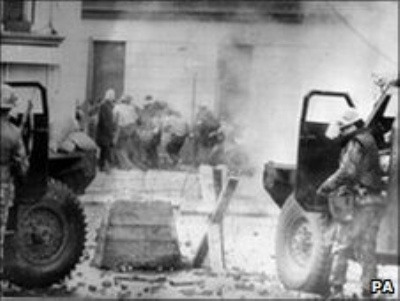
The outcome of the Bloody Sunday inquiry, the longest and most expensive public inquiry in UK legal history, is due to be made public later.
Thirteen people died in 1972 when British soldiers opened fire on civil rights marchers in Londonderry.
The Saville Report was made available to the families' legal teams earlier.
The report was delivered to the Guildhall in Derry at 0200 BST on Tuesday. It cost £195m and took 12 years to complete.
The shootings were among the most controversial state killings in the Northern Ireland conflict.
The marchers were shot dead on 30 January 1972 when British paratroopers opened fire on crowds at a civil rights demonstration. Fourteen others were wounded, one of whom later died.
More than 25 years later, in 1998, then Prime Minister Tony Blair established a full inquiry under the auspices of former High Court judge, Lord Saville of Newdigate.
Friends, relatives, politicians and well-wishers accompaned the familes of those killed to the city's Guildhall.
As each of them went into the building, they raised aloft a placard bearing the picture of their dead relative, as the assembled crowd clapped and cheered.
Kay Duddy, whose brother Jackie was the first person to be shot on Bloody Sunday, will be among the first of the family members to see the report.
"We've waited so long for this, and now we're finally here, my stomach is in knots," she said, before going into the Guildhall to read it.
"So many times we thought we were so close, and to think that soon we'll see it in black in white... I just hope I can get throught the day," she said.
In her handbag, she carried a handkerchief marked 'Fr Edward Daly' - the same white handkerchief that the priest used to try and staunch the blood from her dying brother's wounds.
She said she carried it to give her strength on this important day.
The families will not come out again until at least 1530 BST, when the contents of the report they are now reading will be revealed to the world.
The Saville Inquiry took witness statements from hundreds of people and has become the longest-running and most expensive in British history.
It closed in 2004 with the report initially due for publication the following year.
According to BBC NI political editor Mark Devenport, while it may not have been the bloodiest day in the history of the Troubles, "the significance of that day in shaping the course of the conflict cannot be overstated".
"The actions of the Parachute Regiment in shooting dead 13 unarmed civil rights protesters immeasurably strengthened Irish republicans' arguments within their own community and provided the Provisional IRA with a flood of fresh recruits for its long war," he said.
Our correspondent also said Bloody Sunday set in train the suspension of the Northern Ireland government in March 1972, which led to the decades of direct rule from London.
The full process of restoring devolution was only completed in 2010.
An inquiry chaired by Lord Widgery was held in the immediate aftermath of the killings but it failed to satisfy families of the victims.
Later in the day, Prime Minister David Cameron will formally announce the report's publication in the House of Commons.
The media will have embargoed access one hour before publication at 1530 BST.
Among the issues which Lord Saville will address are the allegations contained in the 1972 Widgery Inquiry into the killings that some of the dead and injured were gunmen or bombers.
Bloody Sunday campaigner Eamonn McCann said he would be "surprised and deeply disappointed" if this claim was upheld by Lord Saville.
"Based on the evidence, I'm confident he is going to find that none of the dead or wounded were nailbombers or gunmen."
This was accepted by the soldiers during the inquiry, but they maintained the victims were shot by mistake while they were firing at armed men.
There has been speculation that Lord Saville's report will say that some were unlawfully killed.
A republican paramilitary group, the Official IRA, have said they fired a small number of shots on the day.
Northern Ireland's Deputy First Minister, Martin McGuinness, who was a member of the Provisional IRA in 1972, also faced questions from the inquiry as to his activities on Bloody Sunday.
The report will include findings on both wings of the IRA.
The relatives of those killed on Bloody Sunday also believe Lord Saville must consider the role and responsibility of senior figures in the Army and government in 1972.














